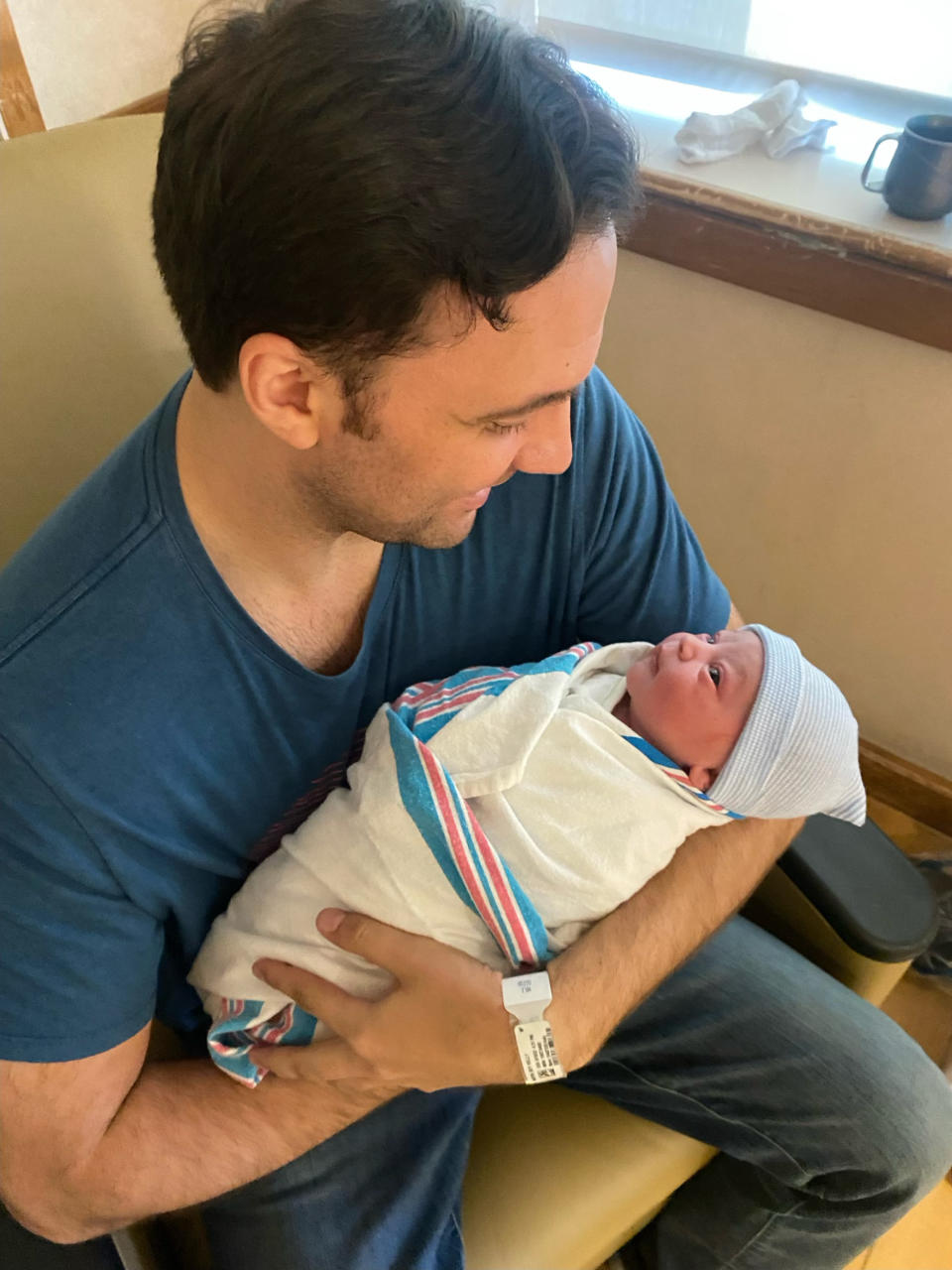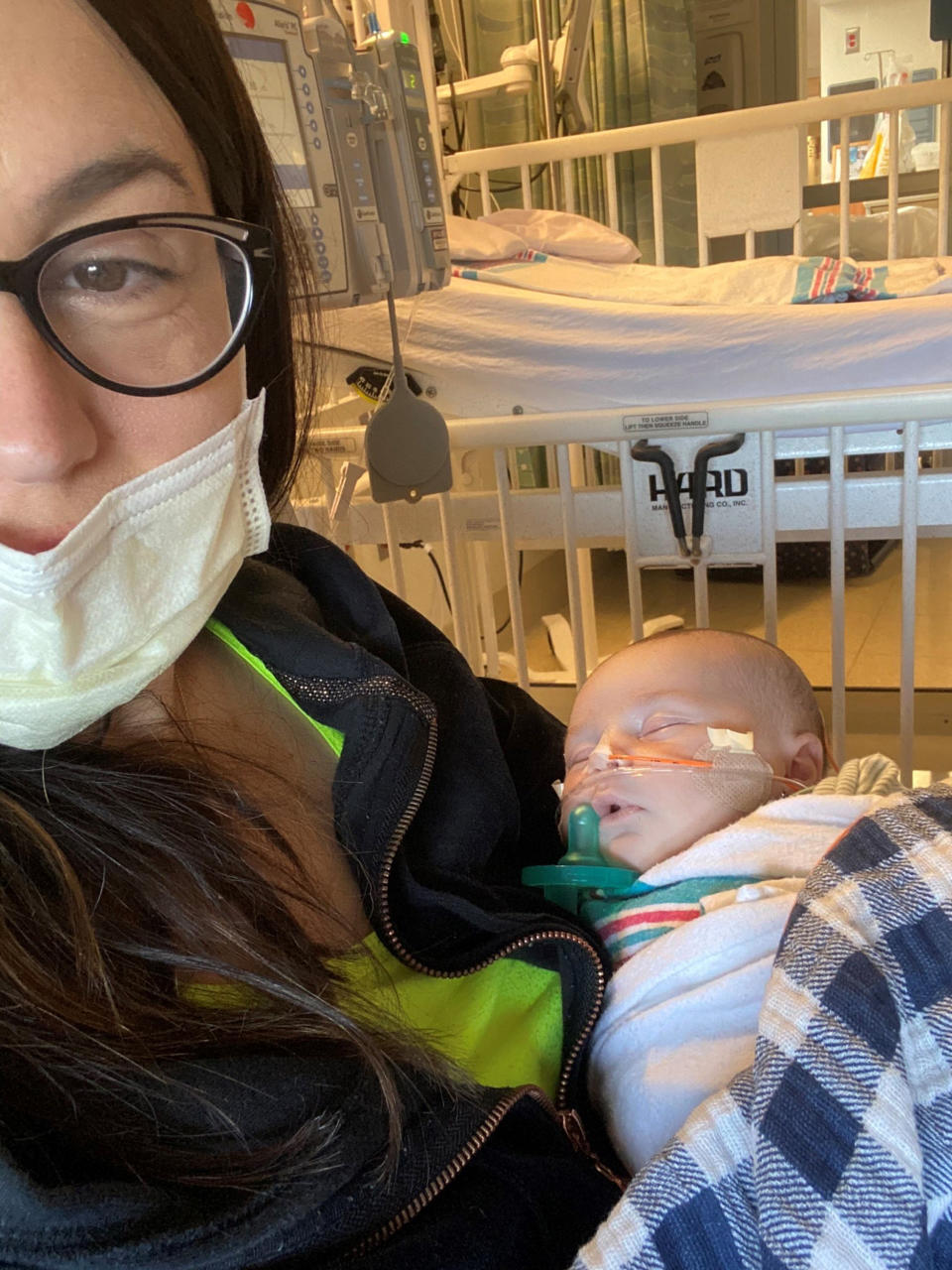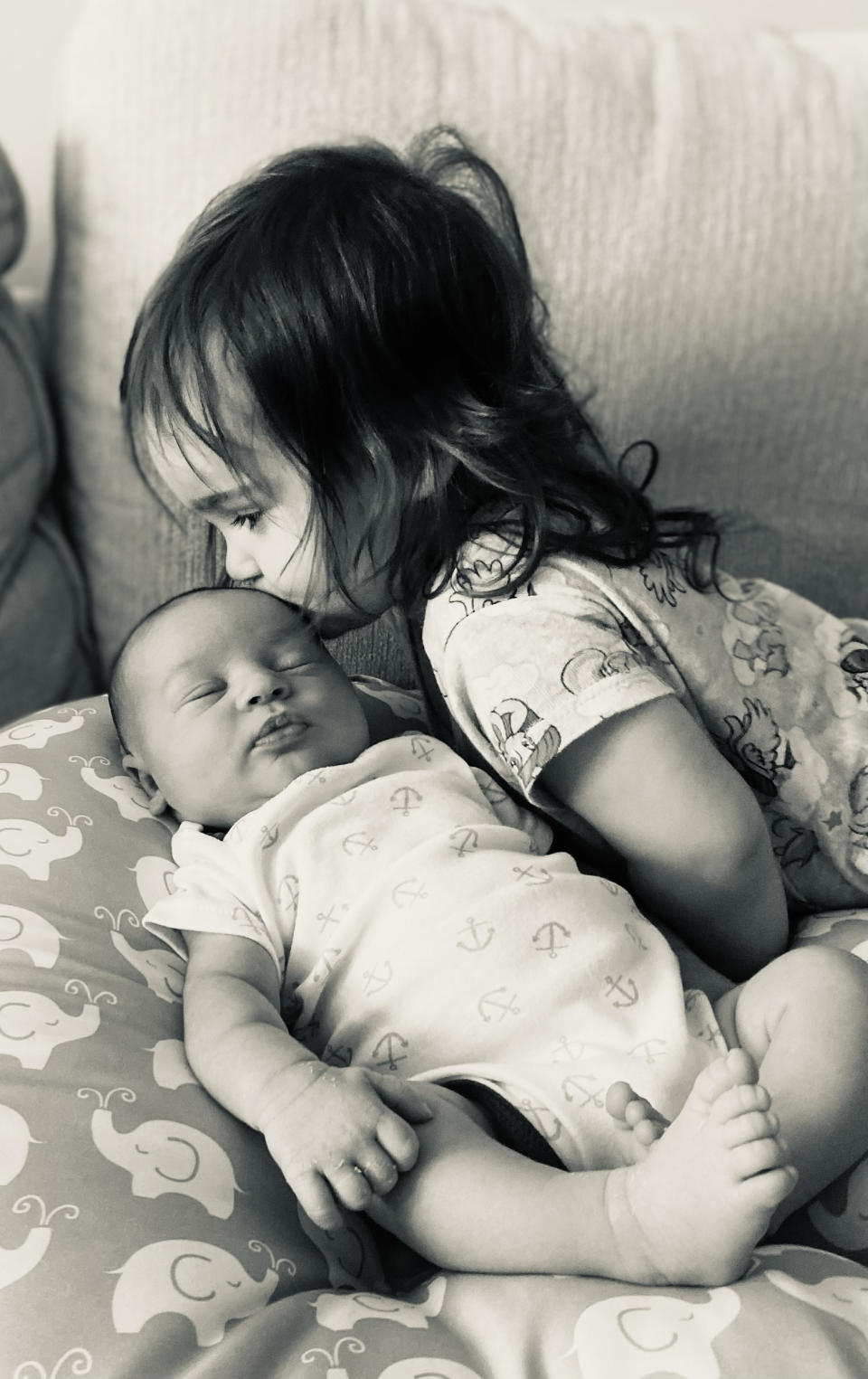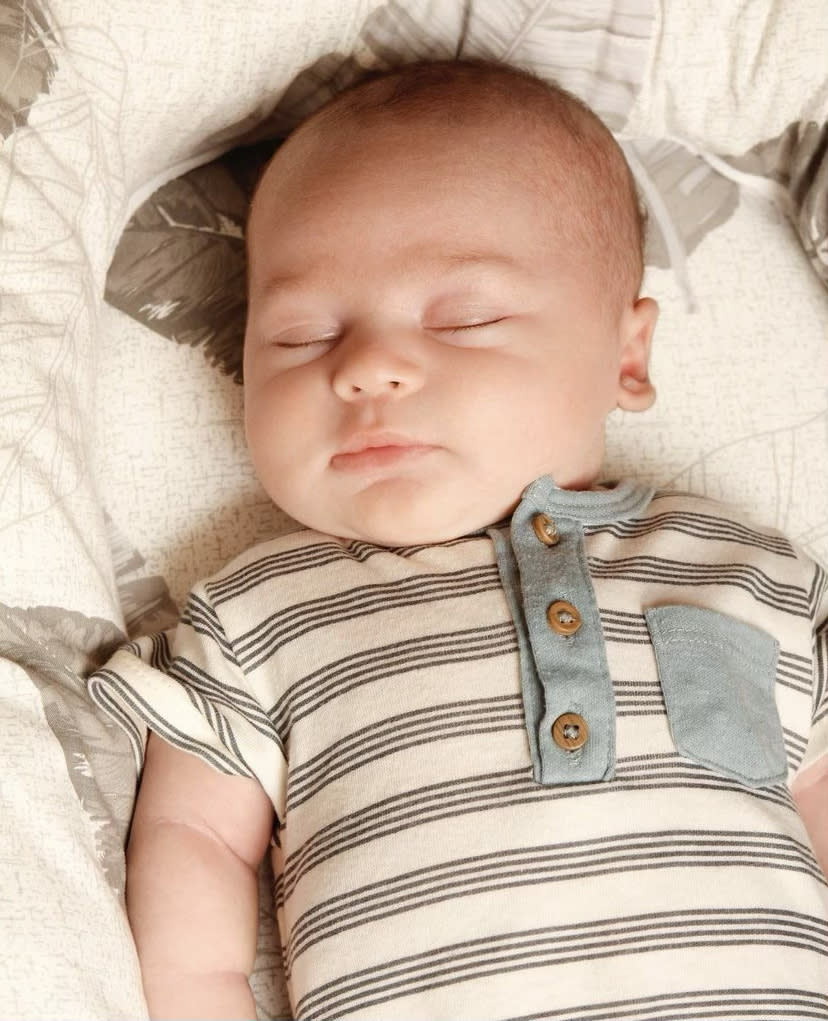Family details newborn son's symptoms when battling parechovirus
In early July, Kelly and Rob Martin noticed their 13-day-old son, Jaxon, slept through two feedings. Even in his first weeks of life, he faithfully ate every three hours. But he was becoming “inconsolable.”
“He was getting really, really fussy, making weird noises when we touched his abdomen and crying a lot,” Kelly Martin, 34, of Mineola, New York, told TODAY. “Even though we only had him for a couple weeks, we felt like we knew him.”
Their 2-year-old daughter had a low-grade fever, and they thought Jaxon had the same bug. But when his breathing became labored, they took him to the hospital and learned the reason why their newborn was struggling: He had parechovirus.
“I’d never heard of parechovirus, so it was definitely not even on my radar,” Kelly Martin said. “I thought if anything maybe the heat was affecting him.”
Lethargic, fussy and refusing to eat
Jaxon was born on June 19 after an uneventful pregnancy.

“We were commenting how good of a baby he had been,” Rob Martin, 34, told TODAY. “The pregnancy was great. We were like, ‘Wow, this is incredible.’”When their daughter was born, she needed to be in the neonatal intensive care unit. They felt thrilled that they'd left the hospital with Jaxon without any complications. In early July, though, he slept through some feedings, struggled to breathe and cried uncontrollably. Over a sleepless night, Rob and Kelly Martin watched him, fretting about what to do.
“We knew something was off. He was wheezing. He seemed like he was in pain, and it was troublesome. It wasn’t normal,” Rob Martin said. “As soon as that fever hit, we were like, ‘Let’s go.’”
At the time, they thought he had the same cold as his sister and that the heat affected him. Still, they knew a doctor should examine Jaxon.
“Everything’s more amplified when they’re young because the immune system is not there,” Rob Martin said.
The hospital admitted him and tried to take blood to test it. They struggled to find a vein because he was dehydrated. Instead, they did a spinal tap.
“I’m crying, very upset,” Kelly Martin recalled. “It came back as viral meningitis.”

Jaxon had parechovirus meningoencephalitis, swelling of the brain or its lining caused by the parechovirus. The staff kept assuring them that treatment would take 48 hours and then they could return home. They went home to pack a bag for the stay, and Jaxon's health worsened dramatically.
“They had to intubate him,” Kelly Martin said.
What is parechovirus?
In July, the U.S. Centers for Disease Control and Prevention issued a health alert that parechovirus, a common childhood virus, was circulating in multiple states throughout the country. In older children, it often leads to a cold, and parents never learn that it's what caused their child’s sniffles. In newborns, it can be severe.
Two weeks after the warning, the CDC issued a report on a cluster of 23 infants in Tennessee who developed parechovirus meningoencephalitis from April 12 to May 24. All but one of the babies were hospitalized, and while most recovered, two have lingering complications, including seizures and hearing loss.
“Parechovirus is a type of ... respiratory virus,” Dr. Chantal Bruno, pediatric critical care physician at NYU Langone Hospital — Long Island, told TODAY. “There’s really no way for parents to specifically know what virus their child has.”
Signs of a parechovirus infection in infants include:
Difficulty breathing
High fever
Poor feeding
“Not every baby needs to come specifically to the emergency department,” Bruno said. “But (they should go) to a medical provider for an evaluation."
Parechovirus cases historically were seen in late summer or early fall, but that’s changed.
“For a variety of reasons, viruses seem to be losing some of their seasonality,” Dr. Joseph Stambouly, chief of pediatric critical care medicine at NYU Langone Hospital — Long Island, told TODAY.

There’s no vaccine to protect against parechovirus, and the treatments include supportive care.
“The various degrees of supportive care are basically things that one can do at home all the way up to, for those unfortunate children, mostly young infants, needing ICU level care,” Stambouly said.
Infants less than 1 month old are “more susceptible to any type of virus," he added.
“We typically try to work them up a little bit more extensively than you would potentially with an older child because their immune systems are not as strong,” Bruno said. “The fact that Jaxon was only 13 days (old) when he presented already put him at a disadvantage.”
Bruno and Stambouly urged parents to call their pediatrician or go to the hospital when their child seems ill, especially if they're newborn.
“Minutes or hours make a difference,” Stambouly said. “If you look at Jaxon’s course, it was a matter of hours after presenting, less than 12 hours, that he took a dramatic turn for the worse. If his parents would have waited those 12 hours to ride it out, it could have been a much different story.”

Jaxon needed a lot of support for several days in the hospital.
“He required a breathing tube to help him breathe. He required medication to help bring up his blood pressure to support his other organ functions,” Bruno said. “Once he was at a point where his body was starting to fight off a good amount of that virus, he started to improve relatively rapidly.”
"The baby we brought home"
For the Martins, Jaxon’s time in the PICU was “the worst week” of their lives.
“My perfectly healthy baby, who I just had, is in the hospital fighting for his life. It was a nightmare,” Kelly Martin said. “Thank God he’s such a fighter.”
His blood pressure would dip erratically, and he looked bloated. For five days, he was intubated and sedated.
“When we left to pack my bag, I didn’t say goodbye,” Kelly Martin recalled. “Then I come back and he’s sedated. I don’t know if he’s going to wake up.”
Rob Martin also struggled with the unknowns.
“Every time we left the hospital, like a couple hours later we would get a phone call, and they’re like, ‘Oh new results and it’s worsening,’” he said. “That was the hardest thing.”

They could touch Jaxon and talk to him even when they couldn’t hold him. When staff removed his tube, his parents could hold him again, providing them some comfort.
“I was used to breastfeeding, and I couldn’t have any skin-to-skin contact with him,” Kelly Martin said. “He had an IV in his femoral artery and still had all the heart rate monitors on him so that was still difficult.”
Jaxon had to learn how to eat again after receiving all his nutrients through a feeding tube. He aspirated on a bottle and staff thought he might have pneumonia. Luckily, he didn't. Slowly, Jaxon started improving, and when his parents took him home, they felt thrilled by how he was bouncing back.
“He’s been great. He’s just our little boy. He’s so sweet. He’s happy,” Kelly Martin said. “He’s the baby we brought home.”
The couple urged fellow parents to call their doctor or visit a hospital if they notice their baby is sick.
“It’s important to trust your gut, to care for your child because you’re their biggest advocate,” Kelly Martin said. “You have to look out for them because they can’t do it.”

